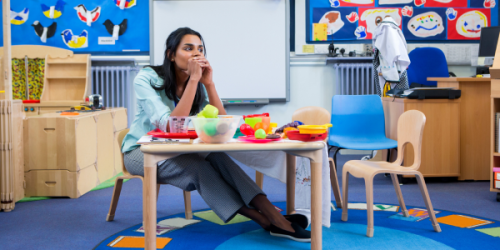Raising standards is hard. But as painful as it is to decide that not everyone is cut out to teach or that some candidates aren’t prepared well enough to do so, the alternative is a travesty. Letting weak candidates into teaching robs the profession of its integrity and can cheat children for a lifetime.
Earlier this month, Manhattan’s U.S. District Judge Kimba M. Wood ruled that a general knowledge test that New York formerly required teachers to pass was discriminatory toward minorities. A previous test suffered the same fate; a third one could be thrown out next.
Though many teacher candidates of all races struggled to pass the disputed test, minorities failed at a higher rate than whites and that continues to be true with the new test. Unfortunately, this pattern is reflected on virtually every achievement test, a tragic testament to this country’s long and unconscionable history of delivering inferior education to people in poverty and particularly people of color.
Even though the deliberate discrimination of Jim Crow and “separate but equal” have ended, as a country, we’ve replaced those overt policies with more subtle but still shameful practices.
Almost as a matter of course, new and weak teachers continue to be assigned to schools with large concentrations of high-needs children. Disadvantaged children of all races, but especially African-American and Hispanic students, pay the price of a system that encourages and rewards our best teachers for working with the most privileged children.
Raising expectations for aspiring teachers while simultaneously increasing the number of teachers of color are not mutually exclusive goals – though they are often painted as such. But it does require us to recruit reasonably strong candidates, training them well and – importantly – rewarding and elevating them and the profession for doing relentlessly demanding work.
In her decision, Judge Wood conceded that the test in question does “not appear to require any significant outside knowledge.” Rather, it tests for such abilities as “reading comprehension, logical thinking, and problem solving.” Curiously, this important judgment has not gotten a lot of attention – and it should.
Of course, every student needs and deserves a teacher who has these skills, and it goes without saying that if a teacher doesn’t have these abilities, she’s unlikely to be able to impart them to her students.
In an illogical turn, Judge Wood then went on to say that it’s an “unproved assumption that specific facets of liberal arts and science knowledge” are important for teachers to know. Many teachers are undoubtedly insulted by that reasoning, and, if presented with it, many parents would be outraged. Why shouldn’t they be?
For many children, the U.S. education system is providing a first-class education that is preparing them to compete and succeed in an increasingly hyper-competitive world. Expectations for these students and for their teachers continue to ratchet up.
Meanwhile, though, judges, lawmakers and policy makers are wringing their hands about whether what’s good for these kids is good for all children. Their hesitation, agonizing, and rationalizing are profoundly handicapping thousands upon thousands of children – some of whom surely could have become great teachers.
More like this

Trained but sidelined: how schools are missing out on mid-career teachers

Good intentions, worrisome results: The impact of emergency teacher licensure in Massachusetts

Not so fast! Why emergency teacher licenses fall short

